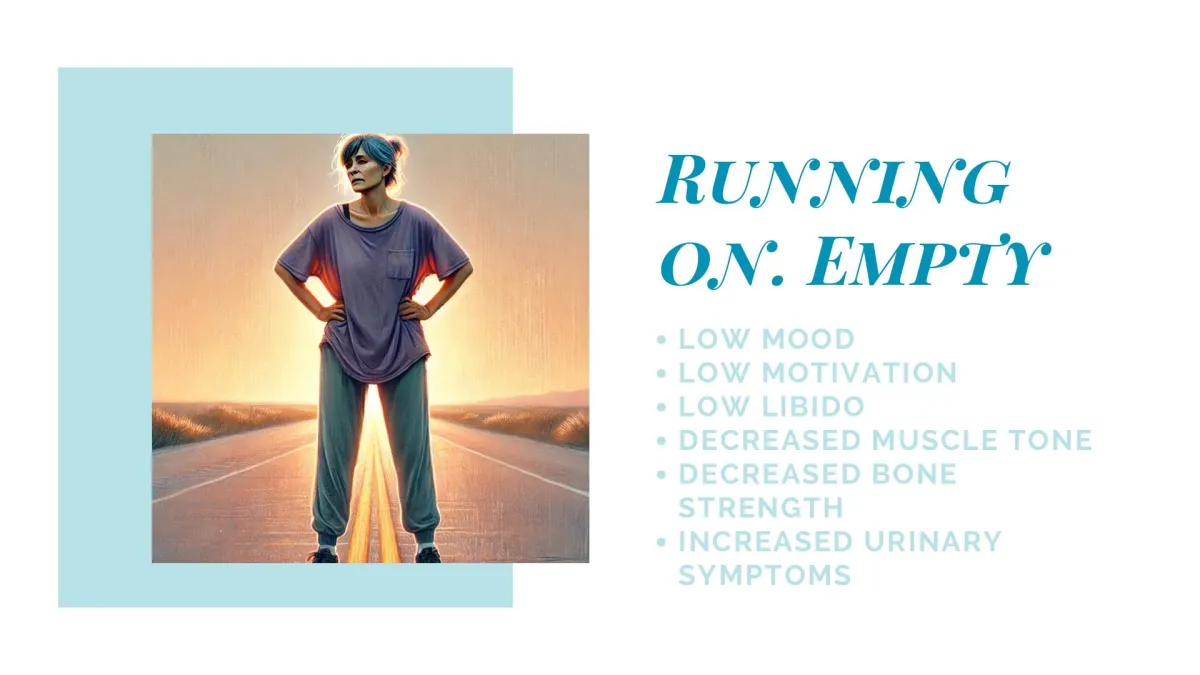
Running on Empty: When Your Hormones Have Hit a Low
If you feel like you’ve lost your spark—the drive, steadiness, or energy you used to count on—you’re not alone. Deep fatigue, mood dips, brain fog, low libido, and frustrating weight gain are all common signs that your hormones have significantly declined, and your body is doing its best to adapt.
This is the Running on Empty pattern, and it’s often seen in late-stage perimenopause or postmenopause, when estrogen, progesterone, and testosterone have dropped to consistently low levels. The transition may be “done,” but your symptoms are very real—and they’re telling you that your body needs more support, not less.
What’s Really Going On?
When reproductive hormones decline, everything from your brain to your bones to your metabolism is affected. Your cells lose the hormonal signals that once helped regulate energy, mood, muscle mass, insulin sensitivity, and cognitive clarity.
On top of that, your body may still be dealing with unresolved stress, inflammation, or nutrient depletion—making it harder to bounce back from daily life. This isn’t just tiredness. It’s your system saying, “I can’t keep going like this.”
Hormone therapy can be helpful—but without the right lifestyle foundation, even that won’t be enough to fully restore your sense of well-being.
What if You’re In Perimenopause?
This pattern can start developing in the later stages of perimenopause, when hormone levels fluctuate unpredictably—and often dip dramatically between cycles. You might notice longer recovery times, emotional flatness, or a sense of disconnection from your body.
If your once-occasional symptoms are becoming more consistent, it’s a sign that your hormone reserves are running low. Addressing this now can help prevent a harder crash once your cycle fully stops.
But What If You’re Already Postmenopausal?
This is where Running on Empty tends to settle in. You’ve likely crossed the 12-month mark without a period, and hormone levels—especially estrogen, progesterone, and testosterone—have remained low. The symptoms may feel dull but constant: low energy, sleep disturbances, mood changes, weight gain, and loss of vitality.
And while the initial transition is over, this phase comes with new challenges: increased risk for osteoporosis, heart disease, insulin resistance, and cognitive decline. The good news? Your body is still adaptable. You can absolutely rebuild strength, energy, and confidence with the right tools.

Symptoms You Might Be Dealing With (Even If They’re Mild):
Deep fatigue or sense of burnout
Brain fog or forgetfulness
Low libido or vaginal dryness
Insomnia or disrupted sleep
Weight gain, especially around the middle
Feeling emotionally flat, unmotivated, or detached
Hot flashes or night sweats that haven’t gone away
Why This Matters
Running on empty doesn’t just make it harder to get through the day—it can quietly impact your long-term health and quality of life.
The hormonal foundation that once supported your metabolism, mood, sleep, and bones is no longer there. But that doesn’t mean you can’t feel like yourself again. It just means you need a new blueprint—one that’s designed for this exact season of life.
What You Can Do About It
There’s no magic bullet—but there is a reliable process. And when you nourish your body with the right combination of lifestyle shifts, hormone support (if appropriate), and daily routines, you’ll start to feel more grounded, resilient, and strong.
While incorporating nutrient-rich foods, gentle movement, and prioritizing rest can offer some relief, addressing the root cause requires a more comprehensive approach.
That’s where the Menopause Playbook program comes in. It’s a personalized roadmap designed to help you understand and manage your unique hormonal landscape. With expert guidance, tailored strategies, and a supportive community, you’ll have the tools you need to replenish your energy reserves and feel like yourself again.
Don’t let hormonal depletion dictate your life. Take the first step towards renewed vitality and well-being.
Want a Clearer Path Forward?
If you’re feeling flatlined and ready for something to change, I invite you to join me inside My Menopause Playbook.
It’s a 4-month group coaching program designed to help women just like you rebuild energy, strength, and confidence—through personalized strategies, science-backed education, and a warm, supportive community. Whether you choose to use hormone therapy or not, this program will help you lay the groundwork your body needs to truly feel better.
You don’t have to figure this out alone. You just need a roadmap—and someone in your corner.
And yes—it’s a 4-month commitment. But be honest with yourself: how long have you been living like this? And how much longer are you willing to stay stuck?
This is your opportunity to reclaim your energy, your focus, and your spark.